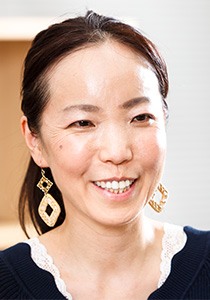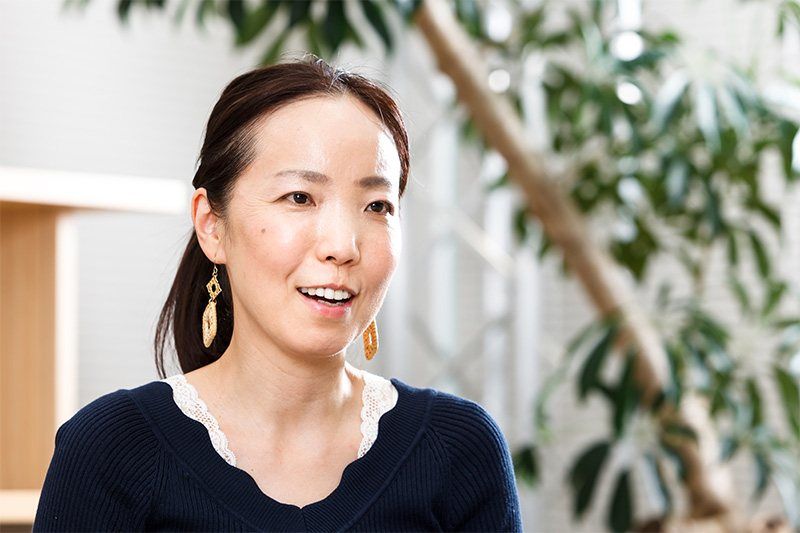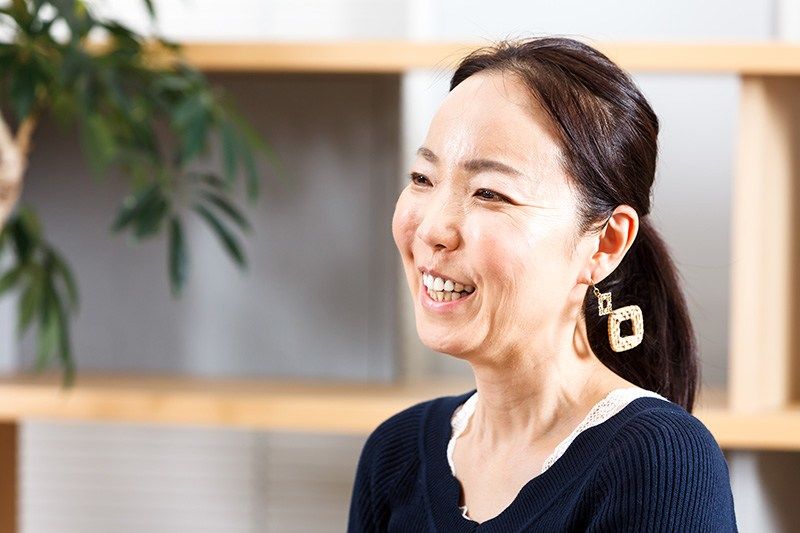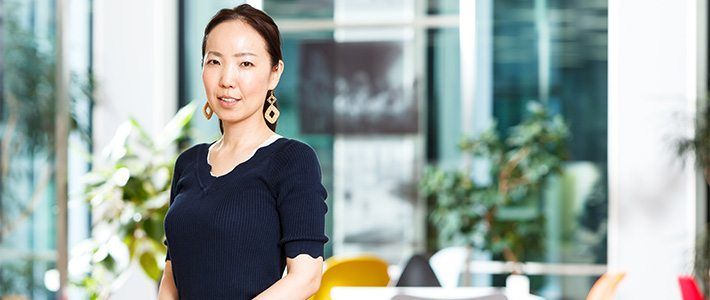
Medicine on the Front Lines: An Interview with Shirakawa Yūko, Field Nurse for Doctors Without Borders
Politics Society- English
- 日本語
- 简体字
- 繁體字
- Français
- Español
- العربية
- Русский
Shirakawa Yūko was just seven years old when a television documentary about Médecins Sans Frontières, also known as Doctors Without Borders, convinced her she wanted to grow up and be involved in humanitarian aid. Thirty years later that dream came true when in 2010 she joined the renowned international medical humanitarian organization as an operating room nurse. To date she has made 17 trips to war-torn regions like Palestine, Iraq, Syria, Yemen, and South Sudan.
We recently sat down with Shirakawa following her return from a stint in the Iraqi city of Mosul to learn more about her work with MSF.
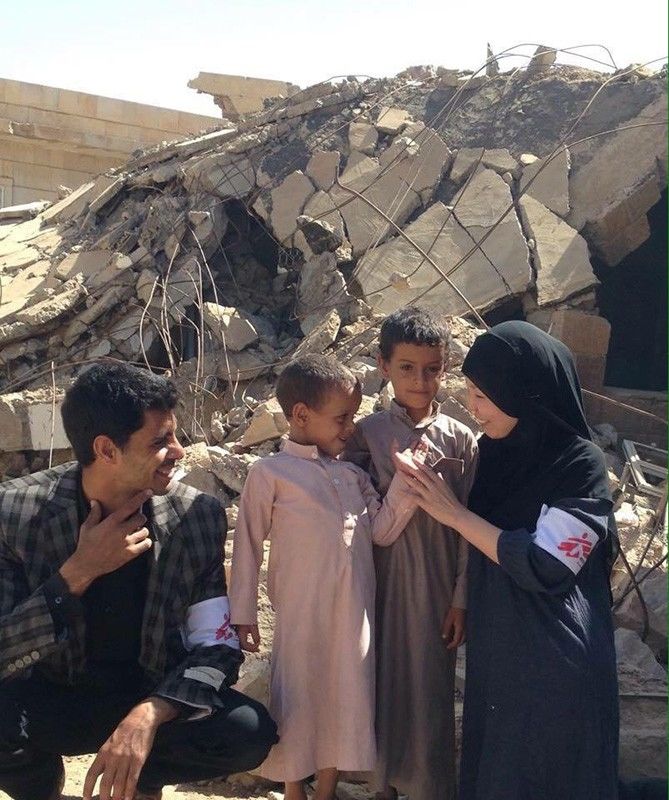 Shirakawa Yūko (right) in northern Yemen in 2015. The hospital where she worked had been partially destroyed by a bomb. (© MSF)
Shirakawa Yūko (right) in northern Yemen in 2015. The hospital where she worked had been partially destroyed by a bomb. (© MSF)
Nursing on the Front Lines in Mosul
In July 2017 Iraqi forces succeeded in retaking the northern city of Mosul from forces of Daesh, the self-proclaimed Islamic State, which had occupied it for three years. Shirakawa joined missions to the city at the beginning of the operation and again in June 2017 as fighting reached its peak.
“During my second trip there were bombs falling and fighting everywhere in the city,” she recalls. “I cared for civilians who had managed to weave their way through the chaos to reach the field hospital.”
The conflict devastated central Mosul, razing homes and destroying vital infrastructure like roads, power stations, and water services. Shirakawa says that faced with such a situation, MSF staff must consider a myriad of logistical issues in setting up an operation.
“The first order of business is determining how to safely get into an area and begin helping people,” she explains. “If there are no buildings that can serve as a field hospital we set up tents or other temporary structures like modified shipping containers. Next, we have to determine how intense the fighting is. This allows us to gauge the number of patients we can expect to treat and work out how to effectively use our limited medicine and supplies. Every little factor must be considered to keep the operation going for as long as possible.”
Even with careful planning, logistical and emotional challenges always remain. Shirakawa on her first mission in Mosul served at a remote field hospital in a Kurdish-held region in the north of the city. Although areas around Mosul were seeing intense fighting, the facility was too deep in the desert for war-wounded civilians to reach. On her second mission, Shirakawa worked at an MSF facility in liberated eastern Mosul across the Tigris River from a heavily contended area in the west of the city. Shirakawa says that among the patients streaming into the field hospital was a Daesh fighter, a girl who had joined the group after her own parents were killed by a suicide bomber. It was a difficult situation for the Iraqi staff, especially those whose friends and family members were killed by the group. However, they were able to overcome feelings of animosity and treated the girl with the same care as other patients.
Following Mosul’s liberation Shirakawa returned briefly to Japan before heading again to the Middle East, this time to Daesh-held Raqqa, Syria. Fighters of the extremist group were under attack by US-backed coalition forces and in desperation had begun using the city’s populace as human shields. The MSF field hospital treated a steady flow of civilians caught in airstrikes or who attempting to flee were wounded by Daesh landmines and snipers. Many of the injured died en route to the facility.
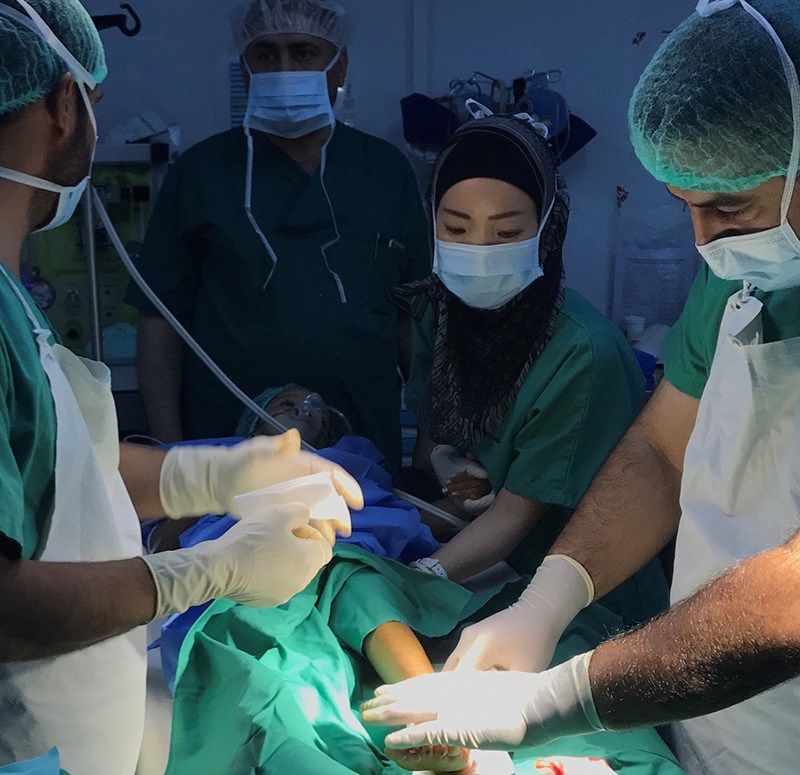 Shirakawa, in Iraq in 2017, helps care for a boy injured during fighting in eastern Mosul. (© MSF)
Shirakawa, in Iraq in 2017, helps care for a boy injured during fighting in eastern Mosul. (© MSF)
Hazardous Conditions
Shirakawa says that for security reasons MSF missions in conflict zones tend to be small. “There are generally eight to ten people, including medical experts like surgeons, anesthesiologists, and obstetricians, as well as supply and technical logisticians and administrators.”
Local medical staff also play a vital role, and missions provide technical training to help them keep hospitals running after MSF teams have left. However, Shirakawa stresses that a single bomb can undo all the progress made in setting up a facility. “Hospitals are constantly in the crosshairs as they are places where people congregate. Some bombings are accidental, but more often airstrikes are deliberate.”
MSF staff in conflict zones also face noncombat risks, such as securing clean water. Shirakawa says that in South Sudan she and her colleagues endured scorching temperatures while working at an open-air field hospital. When the team’s water supply ran out they turned to the nearby Nile River. Even after purifying the water, though, the many corpses floating in the river made drinking an unsavory choice. Left with no other options, Shirakawa says the team did what they had to do to survive.
During the mission the team also ran short on provisions and rationed their supplies so as to continue their work. When Shirakawa returned to Japan she had lost 8 kilograms.
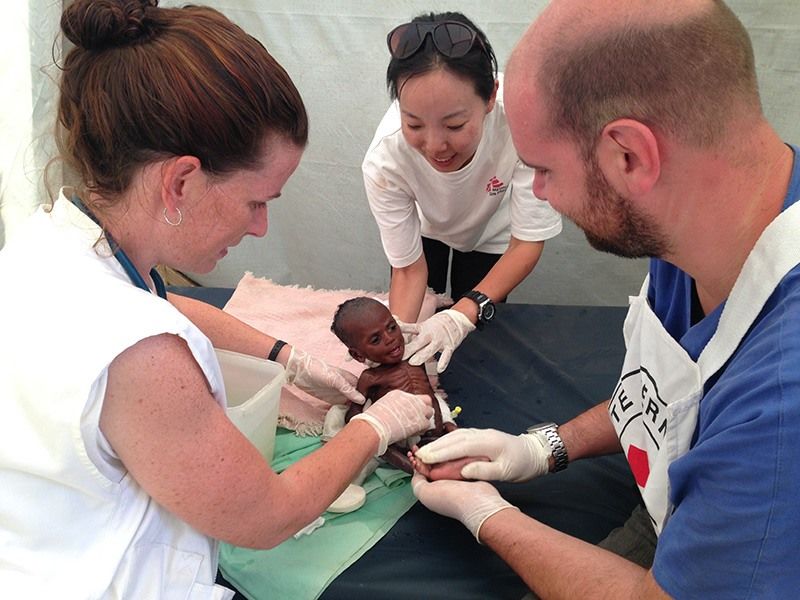 Shirakawa attends to an infant at a refugee camp in South Sudan in 2014. (© MSF)
Shirakawa attends to an infant at a refugee camp in South Sudan in 2014. (© MSF)
True Calling
Shirakawa’s dream of working for MSF may have began when she was a girl, but she says committing to the risks and demands of the job required more than mere childhood aspirations. “I committed to joining MSF in my mid-twenties,” she explains. “But getting my English up to par took time, so I didn’t end up joining until I was thirty-six. It’s good that I waited until I was older and more experienced, though. It’s one thing to be passionate, but it doesn’t prepare you for the harsh reality of working in combat zones. Ideally, participants should be in their thirties or forties and have the professional and life experience necessary to sustain them in a long-term commitment.”
Shirakawa first considered applying to MSF after the group was awarded the Nobel Peace Prize in 1999. She attended an information session, but lacking confidence in her English ability, she decided to wait. While working as a nurse in Japan she saved money and after several years she traveled to Melbourne, Australia, on a language-study program. Remaining in the city, she entered a local university and earned a bachelor’s degree in nursing. She then took a position at the Royal Melbourne Hospital and built experience as an operating room nurse. In 2010, firmly settled into her nursing career, she returned to Japan and joined MSF as a field staff member.
Shirakawa says she honed her person-to-person skills living and working with people of different ethnic backgrounds in Australia. “I learned that fluency in English was not as important as being able to communicate effectively.”
These skills now serve her in her various roles at MSF. As an OR nurse she assists surgeons as they conduct procedures and also serves as de facto head nurse, managing local staff and dealing with unexpected issues that arise. She says she is constantly striving to build trust with staff and other MSF team members, as well as to foster a good bedside manner with patients and their families.
Returning to War Zones
When Shirakawa returns to Japan, normally after several months in the field, she is physically and emotionally exhausted. It takes time to slip back into a normal pace of life—and the stress she feels manifests itself in different ways. “Early on, I was incensed at people who strutted around Tokyo in fancy clothes as if they didn’t have a care in the world,” she exclaims. “I didn’t understand how they could be so indifferent to the bombs falling on innocent civilians in places like Syria and Yemen.”
She has since come to see things differently. “I’ve learned to accept that bombs falling in a war zone and the peace and freedom enjoyed in Japan are two separate realities. Japanese are sometimes criticized for being out of touch with what is going on around the world. But you can also argue that living in peacetime, people should be allowed to follow their own heart’s desires.”
Shirakawa insists that as long as circumstances demand, her place is in the field. “In Syria, for example, hospitals are being bombed and people are suffering. There is a real need for humanitarian aid and emergency medical care. If NGOs and the international community were able to provide adequate support then I probably wouldn’t go. But the current situation compels me to return to the field.”
A Different Perspective
Shirakawa’s resolve has not always been so strong, though. After two years with MSF, the constant gunfire and endless flow of critically wounded patients forced her to reevaluate the work she was doing. She says she even contemplated giving up nursing to become a journalist. “I was angry that I wasn’t doing more to stop the carnage.”
What kept her going was the understanding that nursing offered a unique viewpoint of the effects of war. “MSF is committed to saving lives by calling attention the plight of people in the areas it works, which are often off limits to journalists,” she explains. “I realized I could make a difference by sharing my perspective as a nurse.”
Shirakawa recently published a Japanese account of her experiences on the front lines over the last eight years titled Funsōchi no kangoshi (Field Nurse).
As MSF does not have an age limit for field staff, Shirakawa says she is happy continuing working for the organization for the remainder of her career. However, she is also looking to broaden her activities, including using her experience to train younger nurses and raise public awareness.
When Shirakawa attended her first MSF information session there were only six people present. Today, interest in the group has increased to the point that more than 100 Japanese volunteers work in the field each year. Shirakawa says that along with a sense of pride that comes from doing humanitarian work, joy can be found in even the harshest circumstances. “I have made so many wonderful memories with people I would not have otherwise met,” she explains, adding that she most fondly recalls the smiles of patients after long hours nursing them back to health.
Whether as a nurse or working to raise awareness, Shirakawa will remain dedicated to helping the innocent victims of war.
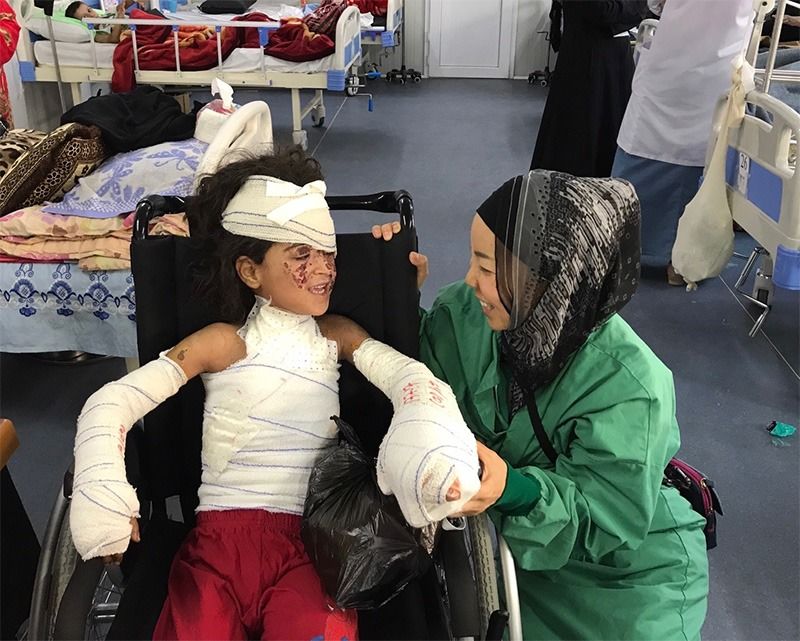 Shirakawa talks with a girl being treated at a hospital in the eastern part of Mosul, Iraq, in 2017. (© MSF)
Shirakawa talks with a girl being treated at a hospital in the eastern part of Mosul, Iraq, in 2017. (© MSF)
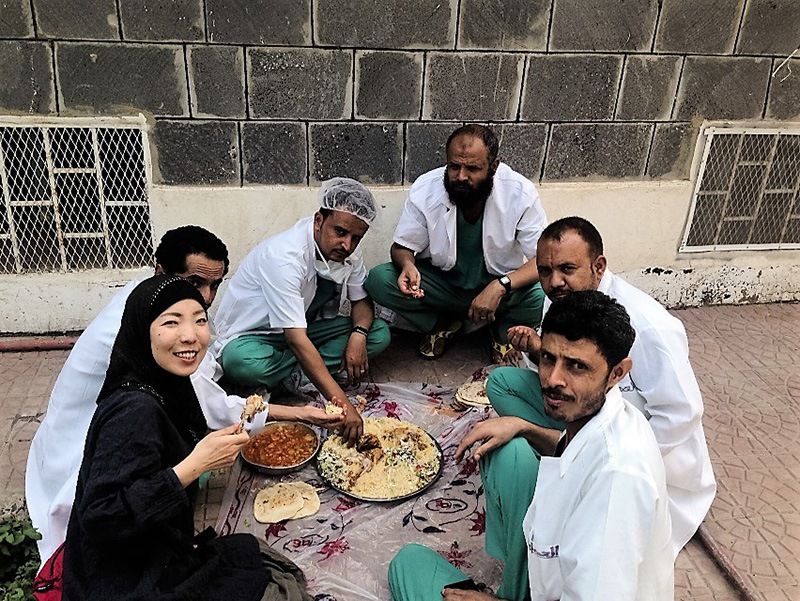 Shirakawa and local medical staff share a meal in Yemen in 2017. (© MSF)
Shirakawa and local medical staff share a meal in Yemen in 2017. (© MSF)
(Interview and original Japanese text by Itakura Kimie of Nippon.com. Photos by Miwa Noriaki except where otherwise indicated.)
